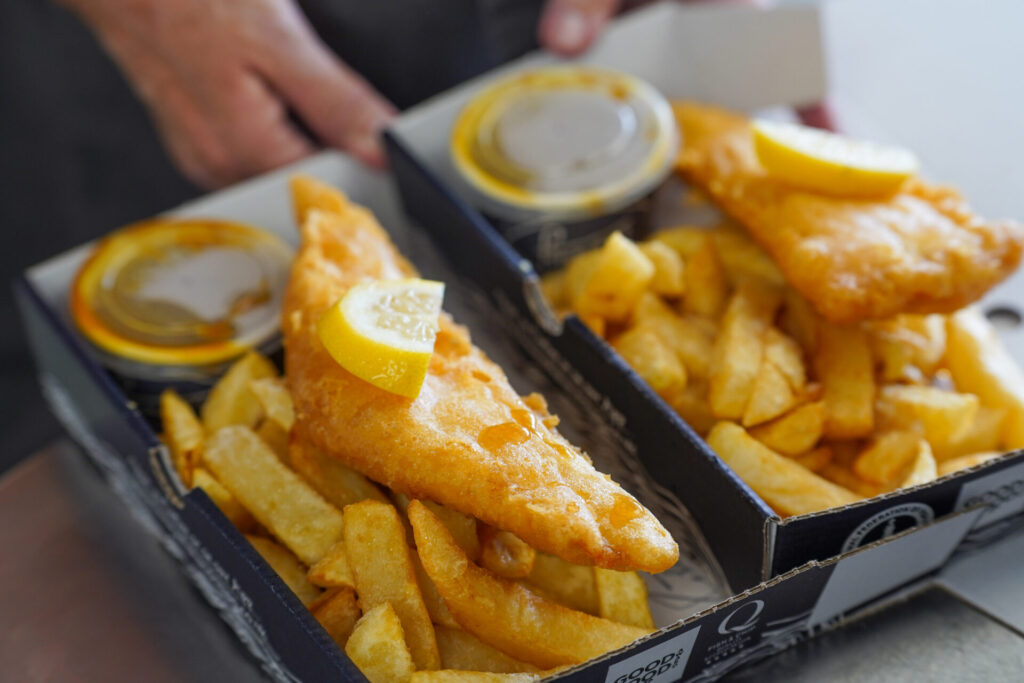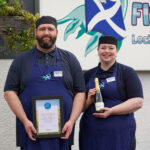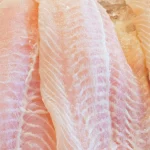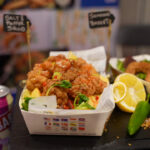Increasing demand for gluten free fish and chips means getting both the batter and the processes right is essential
The gluten free market continues to grow with Coeliac UK’s 2024 Eating Out Report estimating it to include 2.9 million people with a projected spend of £3.3 billion. However, it’s not just those with coeliac disease driving this growth. Research from Mintel reveals that 82% of consumers who eat or have eaten gluten free foods have not been diagnosed, and nearly two in five (38%) choose these options because they believe it’s better for their overall health.
As demand grows, so too has the quality of gluten free food. Mintel notes that gluten free products have improved significantly in taste, texture and ingredients, with many consumers recognising these improvements and showing a willingness to pay more.
For fish and chip shops, adding gluten free can be rewarding, opening up a whole new market. However, the path to getting it right involves not only selecting the right gluten free batter but also investing in training and building trust.
Gluten v gluten free
So how is a gluten containing batter different to a gluten free batter? Traditional batters rely on wheat flour for both structure and elasticity, qualities that come from gluten, a protein that helps trap carbon dioxide during frying to produce that perfect, aerated crunch. Without gluten, achieving the same light, crisp texture requires a different approach and carefully balanced ingredients. It was a challenge that once limited gluten free batters, but in the past decade, product quality has advanced significantly.
Dave Carpenter, national account manager at Kerry Foods, which manufactures Goldensheaf Gluten Free Batter Mixture, comments: “The non-use of wheat can alter the texture, often delivering a crispier bite due to the alternative ingredients used.”
Finding that balance of colour, lift and hold without gluten is a science in itself, and Dave recommends friers don’t just opt for the cheapest batter mix, explaining: “These will likely use rice flour in the main which, once hydrated into a wet batter and left to stand, can separate due to its density versus water and then you have to keep ‘knocking it back together’. The problem with this is that it can have a negative effect on the raising agents used, causing the batter mix not to deliver the lift expected.”
Rice flour can also feel “gritty” and shorten the life of the frying medium if used in large quantities, he adds. For that reason, Goldensheaf Gluten Free Batter Mix combines a mix of flours – maize, gram and rice to be specific – for a more stable result in its wet form that “performs more like a traditional batter” while delivering a nice natural golden colour.
Goldensheaf’s gluten free batter is made under strict EU Regulation 1169/2011 controls and are approved by the Coeliac Society, reassurance, Dave says, that gives friers confidence in both safety and quality.
Developing a batter that performs like the real thing meant ingredient supplier Ceres had to re-engineer the structure of its Natural Batter Mix. The result is a gluten free batter that is made from an array of allergen free flours and starches, and it too is produced in a completely gluten free site.
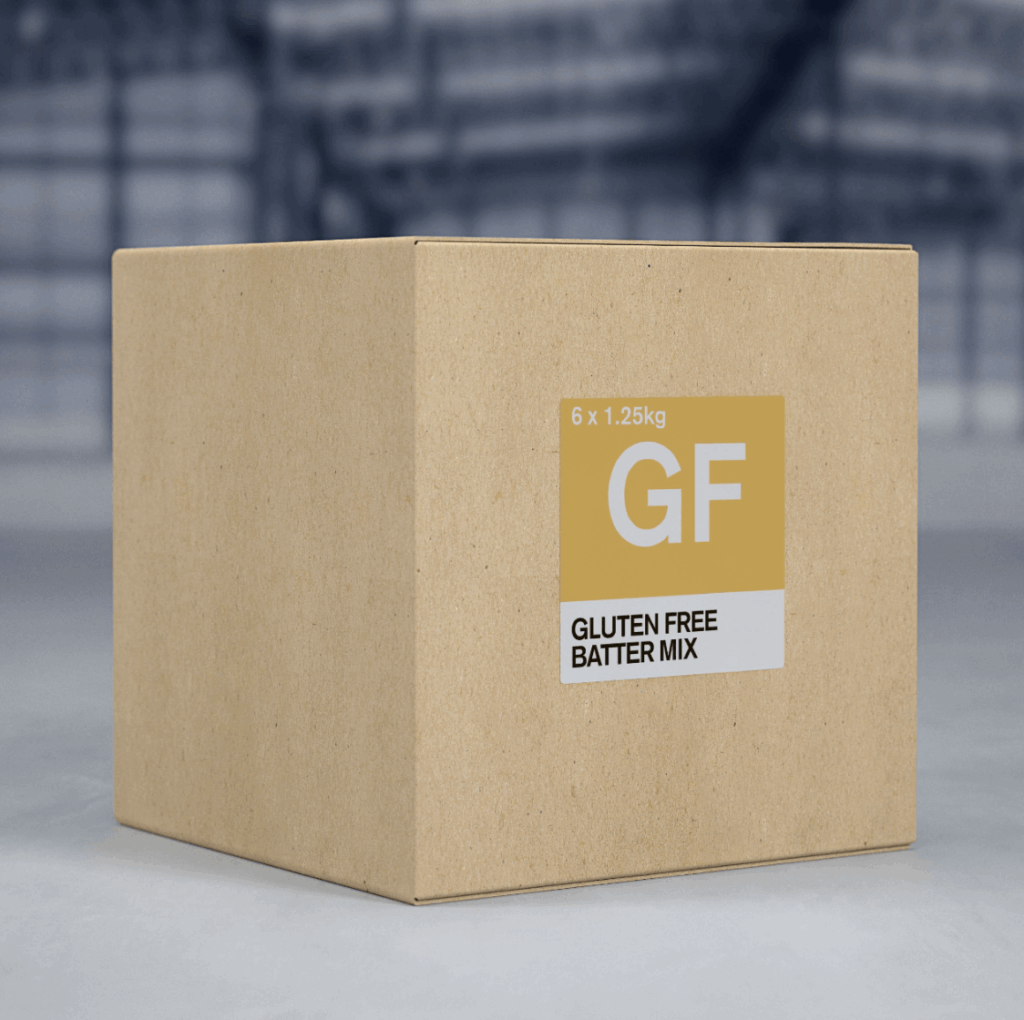
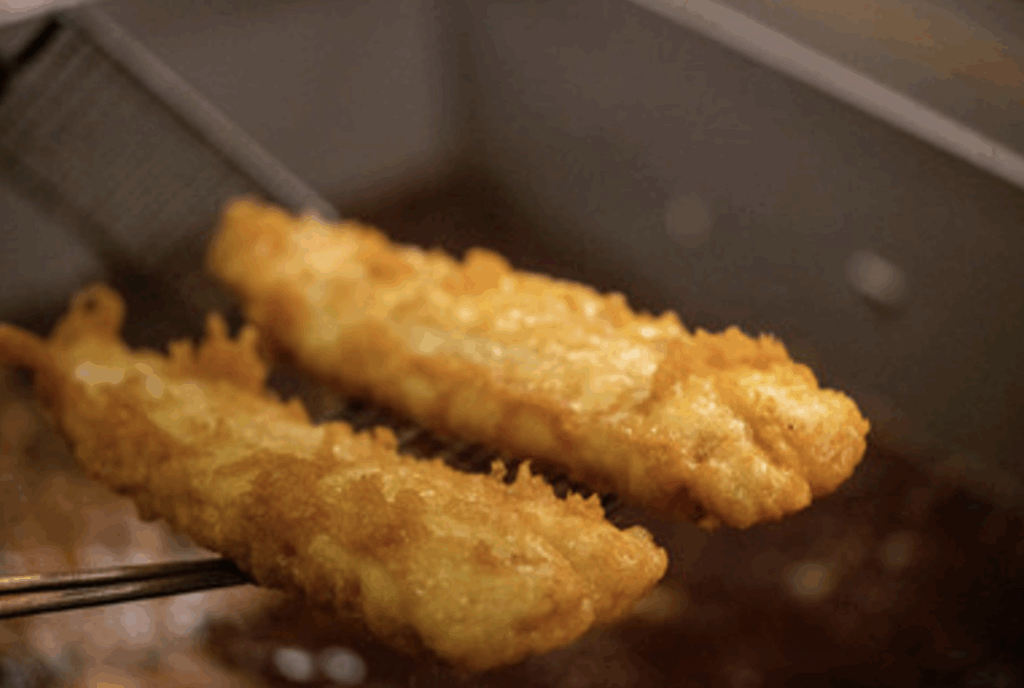
Managing director Stelios Theocharous encourages friers to consider what colour and texture works best for their businesses – something hard and crunchy, or crisp and golden – and to choose accordingly. Its Gluten Free Batter Mix, one of the first allergen free products launched by the company, remains a bestseller. “It’s a terrific product that tastes superb as it’s well seasoned and packed into small bags, which means there is a much reduced chance of cross-contamination,” says Stelios.
Cross-contamination
The issue of cross-contamination is one Stelios stresses is of equal importance for chip shops to maintain their end too, adding: “I would always advise building safety into the menu choice, so don’t offer gluten free on a day where the risks of cross-contamination are higher. The goal should be to reduce risk first and then build on that. Sales will follow if coeliacs feel safe.”
He also advises operators to apply red tape to utensils, have a clean hot box that isn’t used for anything else, and to clearly label gluten free fish and chips so the coeliac eater knows what’s theirs. “And if you have to charge more, then do so. Again, this builds confidence that the practices are correct,” he adds.
At Middleton Foods, innovation and accreditation go hand in hand. The company produces two gluten free batters to give friers more options – Middleton Gluten Free Batter and Premium Plus Gluten Free Batter – both designed and tested in-house to mirror the quality of their standard batters.
Once again, they are made in a standalone gluten free factory to ensure there is no cross-contamination. Sales manager Ryan Baker comments: “There are tolerances for claiming your product is gluten free of less than 20 parts per million. However, at Middletons we like to ensure there is no cross-contamination risk by removing all wheat products from the environment.”
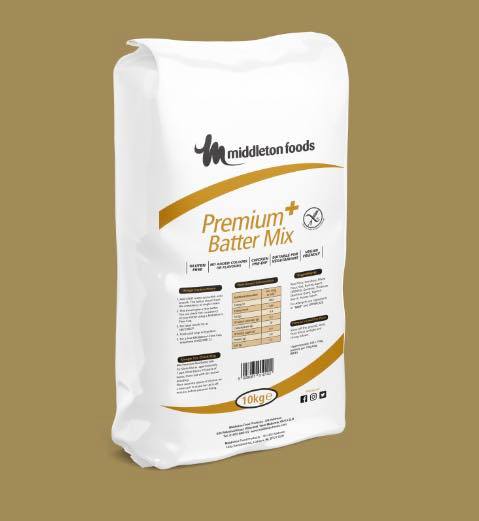
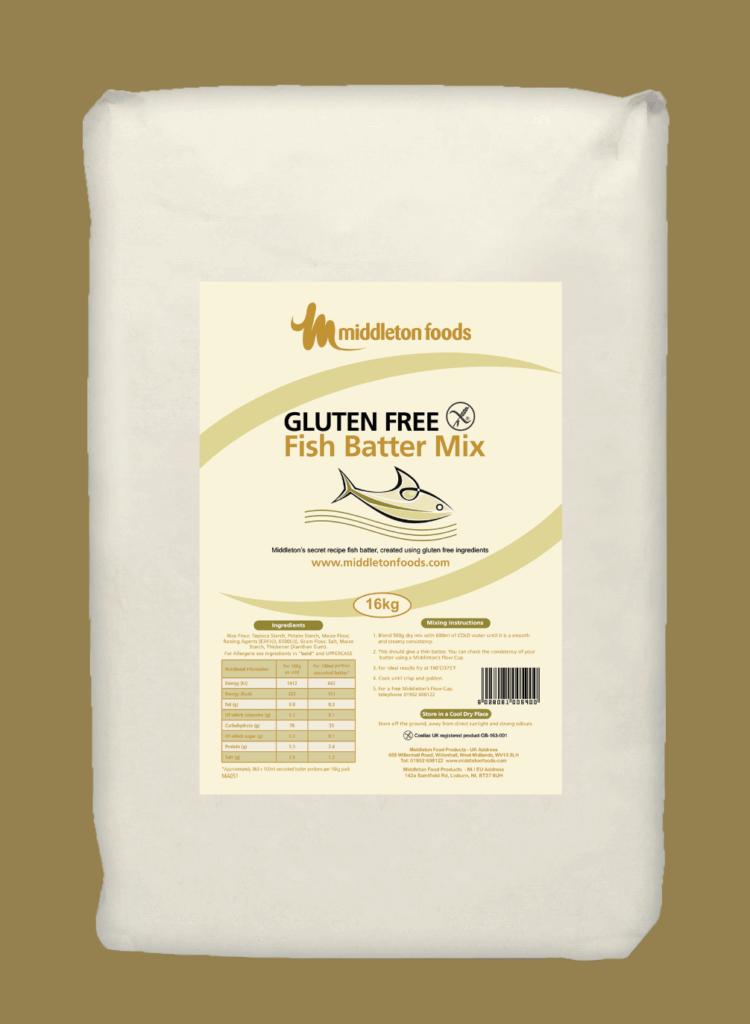
Certified by Coeliac UK, Middleton’s gluten free batters carry the Crossed Grain Trademark, the internationally recognised symbol of gluten free assurance. Building on this reassurance at a shop level, Ryan encourages operators, where possible, to join the Coeliac UK Gluten Free Accreditation Scheme, a program that certifies venues to ensure they meet strict standards for preparing and serving safe gluten free food. His comments are supported by Coeliac UK research, which shows that 93% of diners feel more confident and less anxious when eating out at gluten free accredited venues.
Procedures
For operators, a reliable gluten free batter is only part of the equation. Just as crucial are procedures, training and communication, all of which turn an inclusive offering into a trusted one.
The Real Food Cafe in Tyndrum, Perthshire, has been serving gluten free fish and chips for more than 20 years. Before commercial gluten free batter mixes were available, owner Sarah Heward created her own, but switched to ready-made versions as soon as manufacturers began producing them. She comments: “I used one of the first ever gluten free batters and it wasn’t the best. They hadn’t refined it at that point but they quickly improved.”
Sarah has been using Goldensheaf Gluten Free Batter Mixture for at least a decade and says it’s as integral to her business as her standard mix. “It’s as important to have a good gluten free batter as it is to have a good non gluten free batter,” she comments while also stressing that how the batter is handled is what really matters. “You can use a gluten free batter, but if you don’t follow procedures and you contaminate it, it’s worthless because it’s going to make people ill.”
At The Real Food Cafe segregation is built into every stage of service, from separate fryers and fridges to dedicated filtration systems and utensils. The café is Coeliac UK Accredited, a status it has maintained for ten years. “We train all our staff every year,” she says. “They have to complete a training module on a platform provided by Coeliac UK, whether they’ve done it 10 times before or not.”
The result is both customer confidence and commercial success. Gluten free sales hit £86,000 last year, and having just finished a Gluten Free fortnight, Sarah says sales were up on last year, indicating it’s going from strength to strength.
Sarah agrees on charging more, adding a £1 premium to a standard size gluten free fish and £1.50 for a large. “We do this because it’s more expensive. It’s not just the batter, it’s all the procedures and the training. It’s important you’re doing it properly, and you can’t be subsidising that. Customers understand because what they want is safety. And they will test the staff, they will find out from them how much they know, and if they aren’t sure of something, they won’t trust you. A lot of our customers say in the reviews, our staff really know their stuff.”
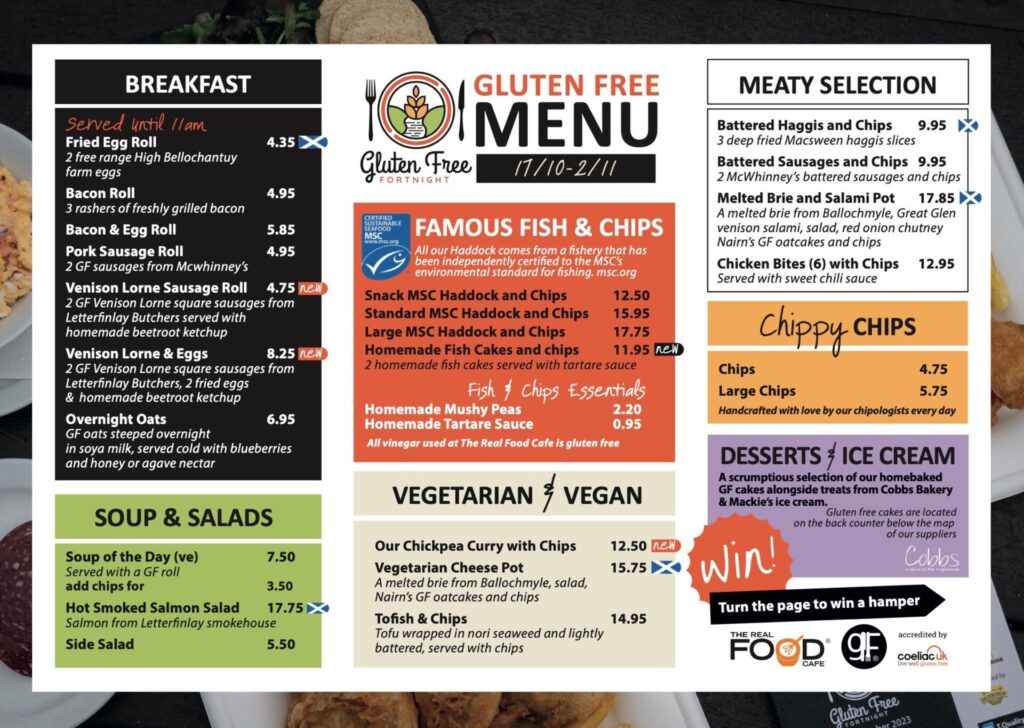
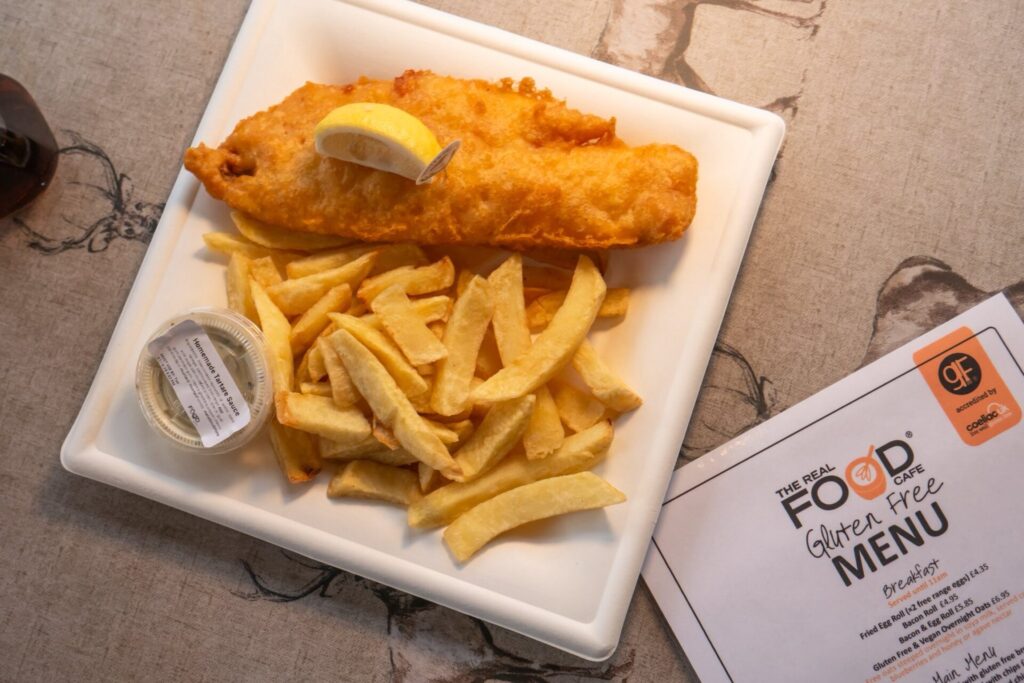
Gluten free prep area
Another operator aware of the costs involved in offering gluten free is Geoff Whitehead, owner of Whiteheads Fish & Chips in Hornsea, East Yorkshire. He made a major commitment to serve coeliacs safely last year when he installed a dedicated gluten free prep area complete with a two pan frying range at a cost of £100,000.
It’s a move he believes will pay off, adding: “With gluten free, you’re satisfying an audience that ordinarily wasn’t able to have fish and chips and they’re bringing the family in with them so you get additional footfall.” That increase, he says, extends beyond just fish and chips to sides, drinks and desserts too.
Whiteheads also charges a small premium for gluten free fish and chips — just 20p — and has introduced a dedicated gluten free menu. This aligns with research from Coeliac UK, which found that 68% of people following a gluten free diet prefer venues offering a separate menu. Clearly differentiating gluten free options helps reassure customers that there’s a reduced risk of error or cross-contamination.
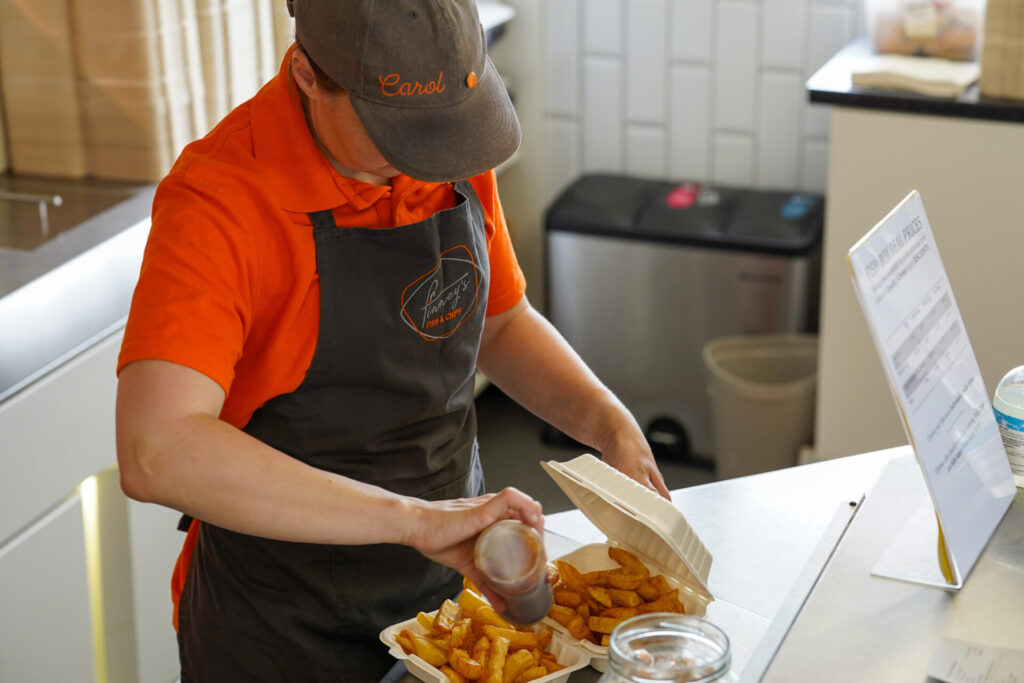
Finney’s in Benllech, Anglesey, also has a long history of catering for the coeliac market. Opened in 2009, owners Carol and Mike Hulme switched to serving solely gluten free fish and chips in 2016 after increasing demand from customers. Since then, they’ve continually been surprised by the amount of coeliacs that come in daily, some travelling over 200 miles. The key to their fish and chips, which they say are so light and crispy that most customers don’t even realise they’re gluten free, is their batter. “We went to Middletons with our recipe for batter and they were able to replicate it, giving us consistency and quality,” says Carol.
Like The Real Food Cafe, Finney’s is Coeliac UK accredited, something recognised by Christopher Kidd, director of commercial services at Coeliac UK, who says: “We’re proud to support Finney’s Fish & Chip Shop in serving up delicious gluten free fish and chips. Middleton Foods’ gluten free products carry our Crossed Grain Trademark so it’s great to see these two organisations working together to make gluten free food more accessible for those who need it.”
The gluten free trend shows no signs of slowing down and whether driven by health beliefs or necessity, consumer expectations for taste and safety are higher than ever. For suppliers and operators, the goal is the same: to make gluten free fish and chips every bit as good as the original.
Recent Posts
- Monster Fish & Chips wins The Peter Hill Award 2025
- Costs rise for sixth consecutive month with fish and fats & oils feeling the pressure
- Deep Blue Restaurants rebrands as Harry Ramsden’s Group
- Aldi sees consumers making more adventurous seafood choices
- ADVERTORIAL: What’s Cooking? 2026 – the ultimate day out for fish & chip and takeaway operators

